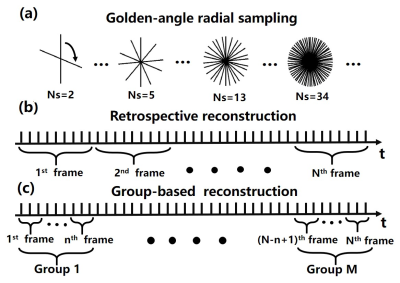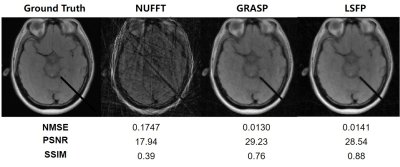Zhao He1, Ya-Nan Zhu2, Suhao Qiu1, Xiaoqun Zhang2, and Yuan Feng1
1Institute for Medical Imaging Technology, School of Biomedical Engineering, Shanghai Jiao Tong University, Shanghai, China, 2School of Mathematical Sciences, MOE-LSC and Institute of Natural Sciences, Shanghai Jiao Tong University, Shanghai, China
1Institute for Medical Imaging Technology, School of Biomedical Engineering, Shanghai Jiao Tong University, Shanghai, China, 2School of Mathematical Sciences, MOE-LSC and Institute of Natural Sciences, Shanghai Jiao Tong University, Shanghai, China
A low-rank and sparsity decomposition with
framelet transform for spatial sparsity was proposed for reconstruction of
interventional MR images. A group-based reconstruction showed that the proposed
method can achieve an acceleration of 40 folds.

Figure 1.
Illustrations of the data acquisition and reconstruction scheme. (a) A
continuous golden-angle radial sampling method was used for i-MRI in this study
(golden angle = 111.25°). (b) Conventional dynamic image
reconstruction based on a retrospective scheme. (c) The proposed group-based
reconstruction method for real-time i-MRI reconstruction.

Figure 2. A
comparison of different algorithms. The ground truth is the 150th simulated
brain intervention image. A group-based reconstruction strategy (10 spokes per
frame, 5 frames per group, a total of 200 frames for 2000 spokes) was adopted
for reconstruction using NUFFT, GRASP, and LSFP. The acceleration factor was about
40.